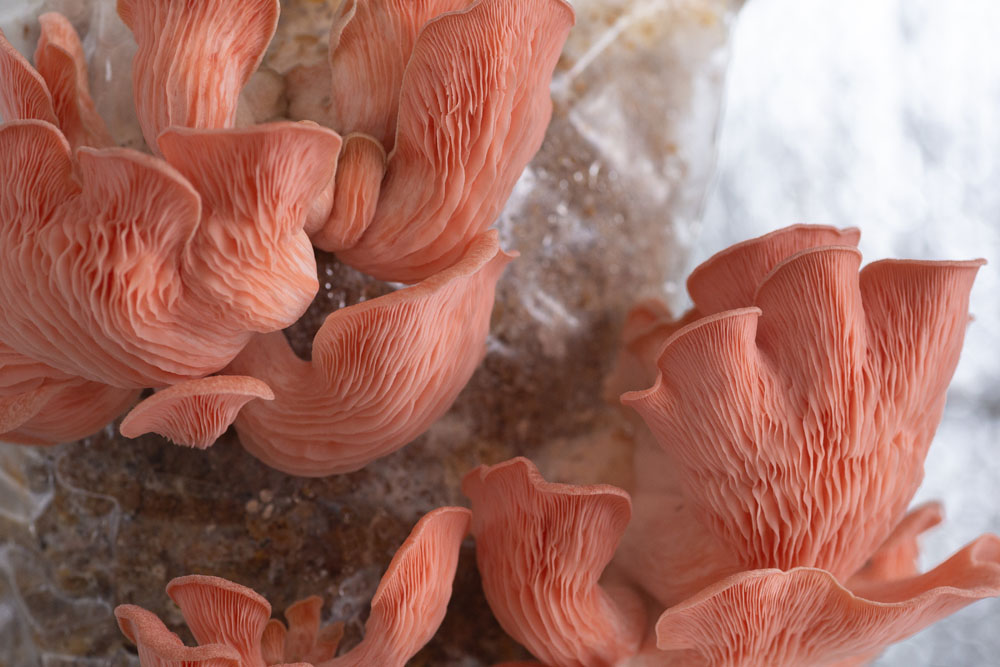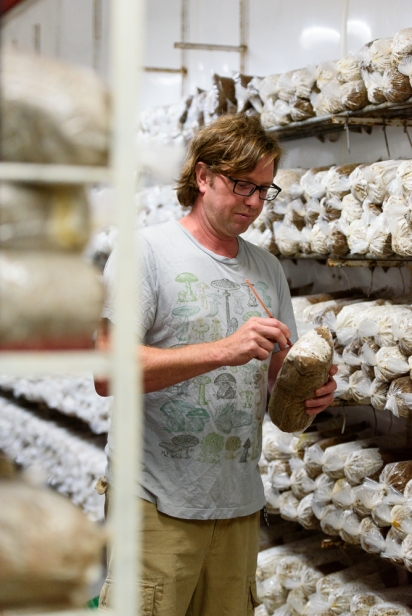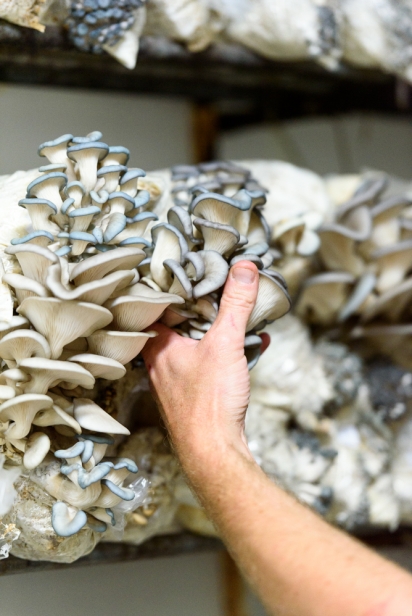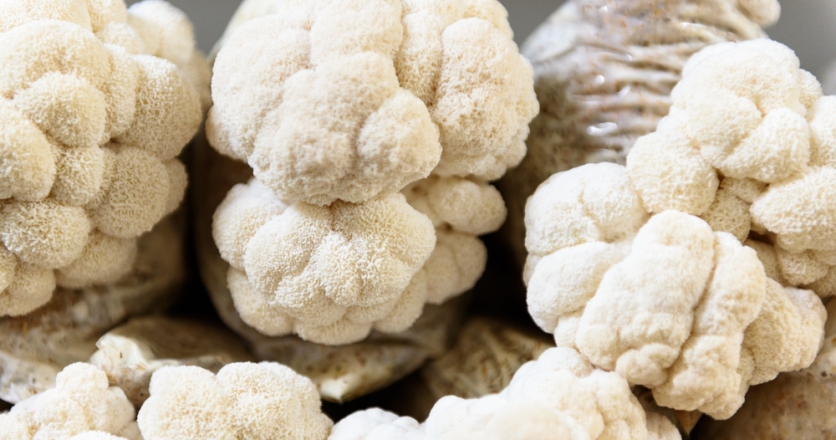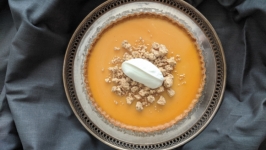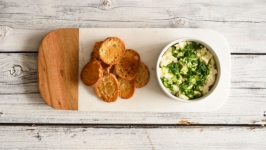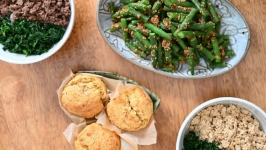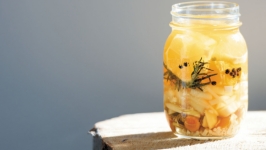The Magic of Mushrooms
It only took one mushroom grow kit to get me hooked. Though the block of inoculated wood and the promise of pink oyster mushrooms from The Fungi Connection was a gift for my roommate, I quickly became invested in monitoring the fruiting progress. I delighted in seeing the growing pink flush above the fridge. A little more than a week later, the first flush was ready for harvest and we enjoyed delicate homegrown mushrooms as part of our Christmas breakfast. After this, I felt as though I was hearing about fungi everywhere — in documentaries, art, at my local bookstore, the farmers' market, and from friends who were growing their own mushrooms, too.
Deb Kelly, who owns The Fungi Connection with her husband Darin, has experienced something similar. "Is it because I'm doing this thing that I hear about it or is it a trend?" she wonders out loud, "But I think it's a trend. It just seemed like this mushroom boom started." And it doesn't appear to be slowing down.
There's been an increase in mushroom cultivators in the area and interest in home growing kits, especially since the pandemic's beginning. The Kellys attribute it to a variety of things: an uptake in plant-based cooking and diets, more research leading to increased awareness on everything from fungi's medicinal properties to their role in maintaining healthy forests, and their potential for mitigating certain adverse effects of climate change.
When edible reaches Christophe Marineau-Mes on the phone, he's just back from the forest and a rainy morning of foraging for black trumpets and chanterelles. While Marineau-Mes cites the pandemic-induced desire to grow food at home and find fungus in the woods, he's seen interest in fungi trending upwards for the past decade. When he first started selling his foraged finds, Marineau-Mes was the only person providing chefs in town with local wild mushrooms, but now he points out that there tends to be someone in every restaurant kitchen who is ready to go out and find their own ingredients ("which is great," he adds).
Since launching Le Coprin, his organic mushroom farm with his wife, Marie-Élise Trottier, Marineau-Mes' mushrooms have become a staple in the region's restaurants. Over the last 16 years, they've cultivated 25 varieties of mushrooms, and these days, they're inoculating 2,000 bags every week. Like other local farms, pre-pandemic, approximately 90 per cent of their business was with restaurants. When demand dropped off as restaurants shuttered, Marineau-Mes had to quickly turn to online sales as well as CSA baskets, pop-up markets, and selling to clients who visited the farm directly just outside of Wakefield. "We couldn't stop producing, and people didn't stop eating. It's been an adventure."
Social media has played a role in this mycological renaissance, as well. Just as the internet was full of crumb shots from new sourdough enthusiasts in the early days of the pandemic, Brodie Barrie has seen an explosion in the information on mushroom growing and foraging available through popular YouTubers and TikTokers. "There's been so much more exposure online for mushroom growing. It's become more accessible for people at home," he explains.
Barrie launched Forest Floor Mushrooms in 2015 after a particularly good year of foraging for chanterelles convinced him it could be a profitable business someday. "There's basically no formal education for growing mushrooms," Barrie explains, and so he headed out to Oregon and British Columbia for workshops and internships. Though he still forages for wild mushrooms in his regular spots, Barrie turned to cultivating to ensure consistent supply and has been selling at the Carp Farmers' Market since 2017. With folks at home keen for DIY projects, Barrie saw record sales for spawn and grow kits.
John and Cathie Bakker count themselves among the people who turned to mushroom growing during the pandemic, but they quickly scaled up their efforts and launched JCB Mushrooms. They have been selling mushrooms to restaurants and at farmers' markets around the city, as well as an ever- expanding variety of grow kits for just over a year now. Though John was keen to start small and run their new mushroom business from home, space quickly became an issue, so he signed a lease on a space in Kinburn in July of 2020, where he has been busy learning and perfecting his processes ever since. "I've basically failed forward — anything that I could do wrong, I did," John says with a laugh. "In some ways, it was the best way to learn, but it was expensive." John is dedicated to giving his customers as much information as possible and has spent a lot of time refining the instructions accompanying JCB's grow kits. He also encourages customers to ask questions and loves hearing about their home mushroom adventures. "Pink oysters are by far the easiest to grow, and the fastest. The kids are just ecstatic over this." (This mirrors my own experience with that first pink oyster kit. Childlike enthusiasm was plentiful.)
JCB mushrooms come from mushroom spawn courtesy of Darin at The Fungi Connection in Kingston. John also spent a day at the Kellys' farm when he was getting started. He lauds Darin's mycological knowledge, calling him "a walking encyclopedia." The Kellys themselves learned from renowned mycologist Paul Stamets in Washington State when they dove into their mushroom business almost eight years ago. Though they were blown away by Stamets' technical and scientific knowledge about mushroom growing, Deb says she was particularly impressed by the connections he described between fungi and forests. "It goes so much deeper," she explains, "and we were learning right in the middle of old growth forests, it's the real deal."
The Kellys have been offering training to other mushroom growers remotely throughout the pandemic and are keen to get back to comprehensive education onsite. They're building a new facility four times the size of their current space and are hoping to move in January of 2022. "Right now, we're just bursting at the seams. There's not one spot to grow one more mushroom at the moment,” Deb laughs. Their goal is to become certified as Canada's first mushroom training facility next year. They simultaneously plan to increase their presence in Ottawa with more mushroom varieties (think piepino, turkey tails, chestnut) at more markets and have new mushroom products in the works with a food scientist.
While Deb admits that she was slightly more neutral about growing mushrooms than her husband initially, she was soon mesmerized and surprised by the connection she felt to her ancestors. She grew up in a society she describes as fungi-phobic, but she knows previous generations likely foraged with regularity in Europe. "In addition to growing and selling mushrooms, I'm interested in the education side: building relationships, helping to bring back some of that knowledge that was lost and making that connection to nature." This connection led the couple to change their business name from Kelly's Gourmet Mushrooms to The Fungi Connection. "It's about the connection between ourselves and nature, fungi and the ways things grow. Connecting us to the need to make changes if we're going to survive climate change," Deb says.
Along with a renewed appreciation for fungal treasures on a damp forest floor, tending to my little countertop grow kits feels like a small act of reverence for this connection — almost serving as an antidote to the eco- anxiety that so many people experience these days. Neither plants nor animals, the mushroom kingdom occupies a unique space in ecosystems, medicinal and culinary applications, and imaginations. Magic indeed.
Champignons Le Coprin
73 Chem. Echo Dale, Farrellton, Que.
lecoprin.ca | 819.664.8030 | @lecoprin_mushrooms
The Fungi Connection
3439 Highway 38, Kingston, Ont.
thefungiconnection.com | 613.532.6025 | @thefungiconnection
JCB Gourmet Mushrooms
3765 Loggers Way, Kinburn, Ont.
jcbgourmetmushrooms.com | 613.701.6985 | @jcbgourmetmushrooms
Forest Floor Mushrooms
forestfloormushrooms.com | @forestfloormushrooms


